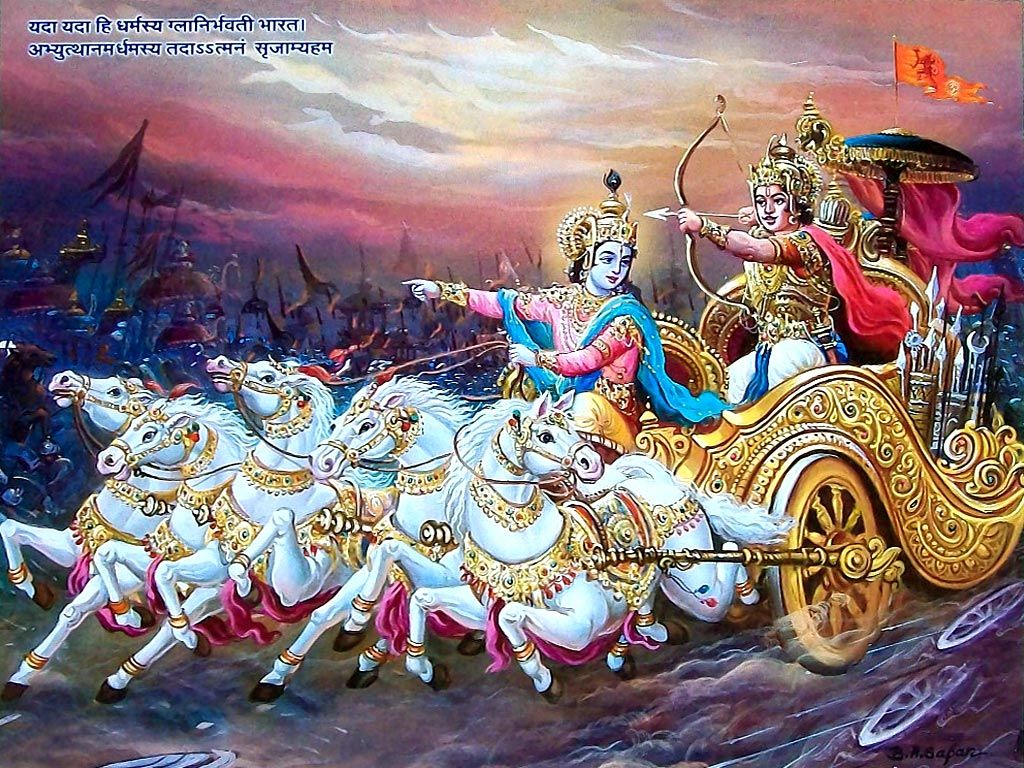Ancient Culture ( Samskaram ) of Bharatham-5.5. : Swami Krishnananda.
-----------------------------------------------------------------------------------
#Opinion :Wednesday, April 14, 2021. 07:16. PM. 2361.
Chapter- 5. Introduction to the Epics - 5.
-----------------------------------------------------------------------------------
An epic, or an Itihasa, as it is called in the Sanskrit language, is basically a history of events that took place some centuries back. We have epics everywhere in the world. We have Greek epics, the Iliad and the Odyssey written by Homer, which delineate the story of the Trojan War and such things, and the achievements of Ulysses, Achilles, and heroes of that kind of the Greek world. The Iliad and the Odyssey are epics. Epics are heroic poems. There is always a spirit of valour, chivalry, a warlike spirit, an action in the epics; and that you will find in the Ramayana and the Mahabharata as we have in the Iliad and the Odyssey. There is another important epic in the Latin language written by Virgil, and that epic is called Aeneid, which refers to Roman history. Then we have got the great epic of Dante, called Divine Comedy in three books, Inferno, Purgatorio and Paradiso, worth reading indeed. It is a wonderful epic of the ascent of the soul from hell to heaven through the purgation of suffering which it has to undergo on the way. Then we have got Milton’s Paradise Lost and Paradise Regained, an English epic. And then we have got stories of Eddas in Iceland culture, epics of Nordic culture, etc.
Likewise, we have heroic poems in India, principally the Ramayana and the Mahabharata in Sanskrit. Actually, India’s culture is not only in Sanskrit. It is also in some other languages, for example, Tamil. The Tamil language is a very, very ancient cultural foundation, and modern English-educated youth have very little access to this culture of the Tamils. As we have got great kavyas or literature in Sanskrit, like Kalidasa, etc., we have got great epics in the Tamil language which are as profound, sometimes I should say more profound, than in Sanskrit verse, such as Cilappatikaram, Manimekalai, Valayapathi, Kundalakeci and Civaka Cintamani. These are the five great Tamil epics. Only those who are capable of understanding this classical Tamil, not the ordinary workaday Tamil, may be able to appreciate the masterly exposition in Tamil of wondrous secrets of human life. We have epics in the Kannada language, in the Telugu language, etc., also adding to the cultural value of the entire country. But the origin of the concept of the epic arose from the Ramayana and the Mahabharata, which are translated in poetic style by great experts in other languages also. The idea behind these epics is to instil into our mind an emotional appreciation of the very same truths of the Srutis and the Smritis, the Vedas and the Dharma Shastras.
I again repeat to you to read one or two books that I suggested: Foundations of Indian Culture by Aurobindo, Human Cycle by Aurobindo, Eastern Religions and Western Thought by Dr. Radhakrishnan, and other introductory books like The Spiritual Heritage of India by Swami Prabhananda, and I added one more the other day, Vedic Religion and Philosophy by Swami Prabhananda. Read these books. You will have some idea as to what actually is the implication of what I am speaking to you.
When you read the epics, this glorious Ramayana and the Mahabharata, you will always feel that you are stimulated from inside, as if you are drinking a cup of strong coffee. You are stirred up. After reading some passages of the Ramayana and the Mahabharata, you will not be the same person that you were before you took up the book. And they are so impressive, so catching, so enlightening and absorbing, that you would not like to keep the book down. Some of the plays of Shakespeare also are like that. When you start reading some of the plays of Shakespeare, you would not like to keep the book down unless you complete the whole thing – so absorbing, and so very interesting and practical. They are emotionally attractive, and therefore it is that you feel the need to study them right from the beginning to the end. Like attractive novels, they will catch you from the very root of your soul, and you would not like to keep them down unless you go through the whole book, so absorbing they are. So the spirit of a novel, the spirit of a literature, the spirit of a heroic poem, the spirit of a spiritual teaching, all these spirits are found clubbed together in these great epics. Masterly literatures are these Ramayana and Mahabharata epics, the Ramayana written by Valmiki and the Mahabharata written by Sage Vyasa.
To be continued ...
=========================================================================
JAI HIND
JAI BHARATHAM
VANDHE MATHARAM
BHARAT MATHA KI JAI.
=========================================================================












Comments
Post a Comment